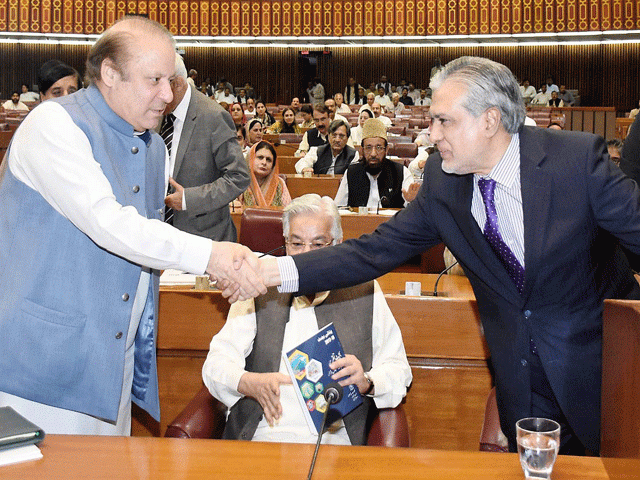Tax policy, debt financing: Budget 2017-18 – fixing fundamental flaws
Positive measures are undone by slow speed and other conflicting steps

PHOTO: APP
This article is intended to analyse two major weaknesses, which the government has repeatedly failed to address over the last four years, which include tax policy and debt financing.
What PML-N did in Budget 2017-18
Having an efficient tax structure is the most important requirement for growth, job creation and fairness. A poor tax policy has been seriously affecting domestic competitiveness and exports.
In fact, with each passing year, not only the government has been failing to correct the existing problems, it has also been encouraging a parallel taxation system through super taxes and regulatory duties.
Even some positive measures, which should have reduced the gap in competitiveness vis-à-vis other countries, have been undone either by their slow speed or their reversal through other conflicting steps.
For example, while the government continued with the policy of reducing the general corporate income tax rate by 1% each year, thus bringing it down to 31%, at the same time it introduced a 3% super tax in 2015, thus nullifying all the reforms over the last three years. It has to be noted that in terms of corporate income tax, Pakistan has fallen far behind the rest of the world as the worldwide average, which used to be 30% in 2003, has come down to 22.8%.
Similarly in the case of customs tariffs, the government has established a unique system of regulatory duties. Each year, it has been arbitrarily picking up a large list of items which it designates as “luxury goods” and places additional duties on them.
As a result of these policies, smuggling has increased manifold. A 2016 study by the Federal Board of Revenue (FBR) showed that smuggling of just 11 categories of goods was worth $9.1 billion. The revenue lost in the form of duties and taxes on smuggled goods was estimated at $2.63 billion or Rs276 billion, which is far higher than the taxes collected on such goods.
Imposition of additional taxes is an incentive for normal trade to be diverted to the smuggling route.
Furthermore, such high protection makes the local industry uncompetitive and complacent. With a hostage market protected through high tariffs, there is no incentive to export to other markets.
As noted by the WTO while reviewing Pakistan’s trade policy in 2015, such taxes “strongly reduce the transparency and predictability of the trading regime, increase its complexity and ultimately support a culture of rent-seeking”.
Furthermore, such duties are illegal as there are international, regional and bilateral commitments to not resort to them.
Deficit financing
The second key issue to address relates to deficit financing. Next year, the federal government will be spending Rs4,753 billion against Rs4,330 billion it will receive in revenues from all sources.
This means it will be spending about Rs423 billion more than its income. In fact, the actual deficit will probably exceed this amount as the revenues are likely to have been overestimated and taxes underestimated like all the other years.
Running such deficits could be acceptable for short durations but continuously having these leads to unsustainable indebtedness.
Already, Pakistan has an estimated debt of nearly $80 billion, which is expected to cross $90 billion by June next year. This year’s interest payment of Rs1,363 billion ($13 billion) is the single largest expense – more than what Pakistan spends on defence or development.
It would have been prudent for the government to think of ways and means to bring this deficit under control. This would save future generations from paying a big chunk of country’s earnings in interest payments.
It will also save Pakistan from repeated financial crises that compel it to frequently borrow at exorbitant terms.
Raise revenues, cut expenses
There are two ways to reduce this deficit. One is to raise revenues, which are pathetically low. But there may not be much scope of that, since the two areas that the government has been relying on for indirect taxes, namely international trade and industrial activity, have not seen much growth for the past 10 years. The government has to consider raising the share of revenue from services, agriculture and through personal income tax.
If it is unable to do so or even if it can, it will be necessary to also reduce expenses. Here again, the scope is very limited as the government seems to have no control over major heads of expenditure such as interest payment and defence.
‘Historic’ Rs1.001 trillion allocated for development budget
For years, the government kept development funds to the bare minimum, but this election year, this restraint has also been lifted.
Perhaps, the only remedy available was to privatise the loss-making state-owned enterprises such as Pakistan International Airlines (PIA) and Pakistan Steel Mills, which soak up over Rs500 billion each year in subsidies and losses.
Unfortunately, the government was unable to do anything in that regard over the past four years and now it is too late to make amends.
Unless the government addresses these two fundamental issues, the country will continue to sink deeper into debt and will become even more uncompetitive.
The writer served as Pakistan’s ambassador to WTO from 2002 to 2008
Published in The Express Tribune, June 12th, 2017.
Like Business on Facebook, follow @TribuneBiz on Twitter to stay informed and join in the conversation.



















COMMENTS
Comments are moderated and generally will be posted if they are on-topic and not abusive.
For more information, please see our Comments FAQ